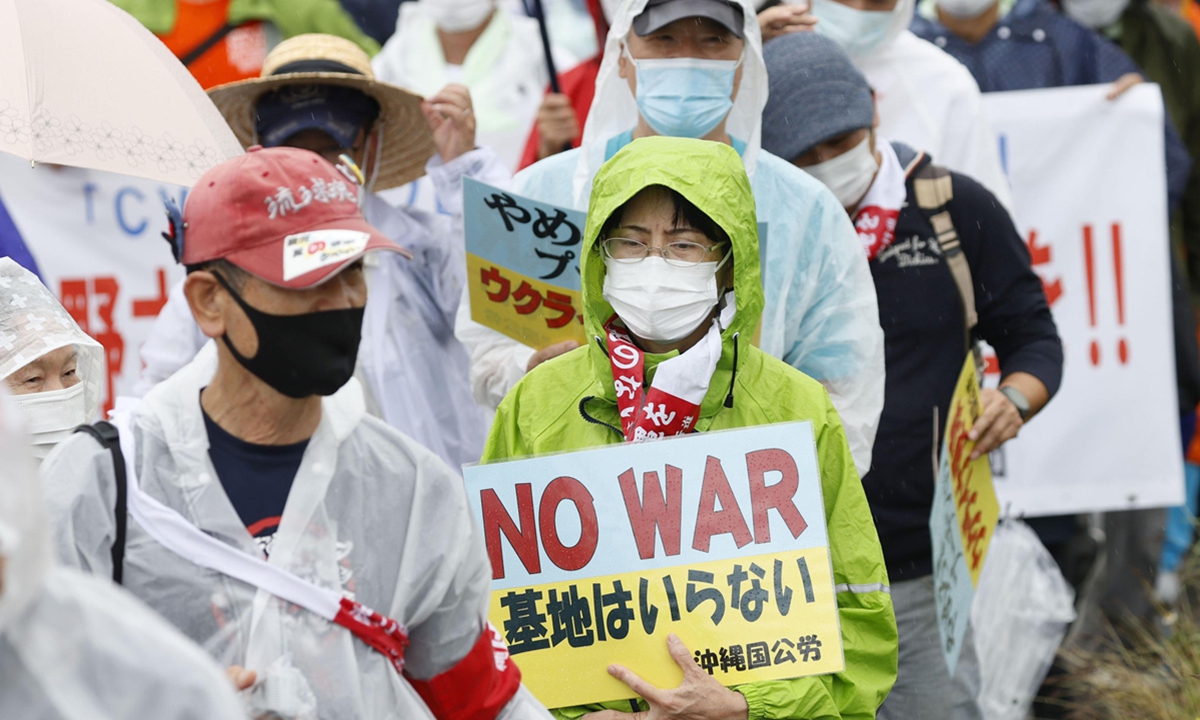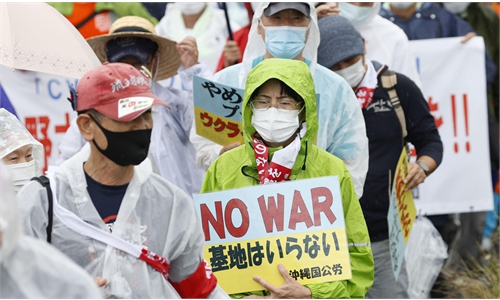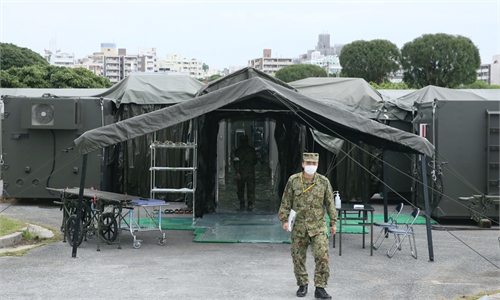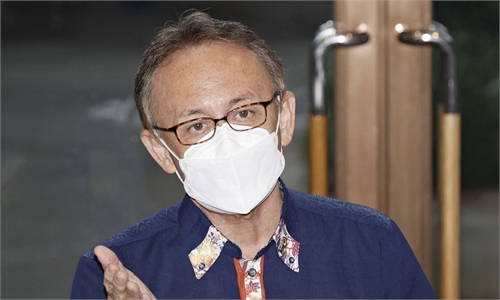Okinawa governor's China visit expected to convey message of peace, seek friendship amid tensions: observers

People hold a march calling for the burden on Okinawa from hosting US forces to be lifted in Okinawa on May 14, 2022. Photo: VCG
Okinawa Prefecture Governor Denny Tamaki is expected to further convey the message of peace and anti-war voices of local residents in his planned visit to China in early July, while emphasizing trade and people-to-people exchanges between China and Japan in the context of the current downturn in China-Japan relations and Japan's increasing cooperation with the US aiming to contain China.
Japan's Kyoto News Agency reported that Tamaki announced on Friday that he plans to visit China in early July. He told reporters, "I want to convey that we trust each other and want to continue our mutually beneficial relationship." Tamaki will participate in the visit to China by the Japanese Association for the Promotion of International Trade (JAPIT) and is expected to meet with economic officials and dignitaries in Beijing.
After that, Tamaki said he plans to head to East China's Fujian Province and exchange opinions on the economy and people-to-people exchanges with local officials, according to the Kyoto report.
Chinese observers anticipated that Tamaki, who won a second four-year-term as Okinawa Prefecture Governor in the 2022 September election, will emphasize peace, anti-war and anti-US base political views during his China visit while making efforts to review and enhance trade and people-to-people exchanges, especially with Fujian Province, which has a shared historical and traditional friendship with Okinawa.
Tamaki's visit also comes after he announced a plan to newly establish a "regional diplomacy office" in fiscal year 2023 that will enhance interaction with other countries.
After the Ryukyu Islands were annexed by Japan and renamed Okinawa in 1879, its fate has become a heart-wrenching lament. Okinawa was involuntarily drawn into World War II and used by the Japanese government as a gambit. In the Battle of Okinawa in 1945, up to one-fourth of the local population died. Okinawa, which occupies only 0.6 percent of the total surface area of Japan, hosts more than 70 percent of the US military bases stationed in the country. The strong dissatisfaction of ordinary people in Okinawa over hosting US military bases has been largely ignored, according to Chinese observers.
Tamaki will likely speak out for the local residents against the backdrop of a downturn in China-Japan relations and Tokyo's upgrading and expanding of its role of serving Washington's scheme to contain China, Da Zhigang, director of the Institute of Northeast Asian Studies at Heilongjiang Provincial Academy of Social Sciences, told the Global Times on Saturday.
Tamaki will advocate for peaceful diplomacy during the China visit, Da noted. "Okinawan people are not willing to become cannon fodder, be it a conflict between China and Japan over the Taiwan Straits or one stemming from the Diaoyu Islands-related disputes."
Japan has drastically adjusted its defense policy, marked by the passage of the three key national security documents - the National Security Strategy, the National Defense Program Guidelines and the Medium-Term Defense Program by the end of 2022, which clearly state that Japan will possess counterstrike capabilities to strike enemy missile launch sites, acquire foreign-made missiles - with the US-made Tomahawk cruise missile in mind - greatly increase defense spending, and calls China the "greatest strategic challenge."
Chinese analysts pointed out that with such developments, Okinawa has inevitably been placed at the forefront of Japan's execution of such so-called counterstrike capabilities and become the base of Japan's cooperation with the US and the West.
A delegation of lawmakers from the Okinawa Prefectural Assembly submitted a resolution to the Defense Ministry, the Cabinet Office and the Foreign Ministry in Tokyo in April, urging the government to actively use diplomacy and dialogue to build peace instead of strengthening Japan's military power in the southwest islands by installing missiles and taking other measures.
The resolution also demanded that Tokyo follow the principles already confirmed in relevant political documents between Japan and China to develop friendly relations and resolve issues peacefully.
To what extent Tamaki will be able to sway the Kishida government's decision to deploy military strength and offensive weapons in the region will depend on the resolve of the Okinawan regional leaders and the efforts of local residents, observers said.




